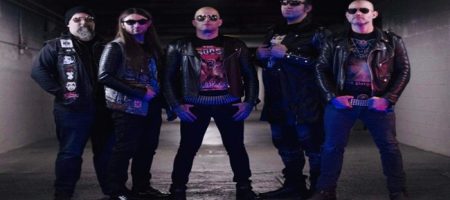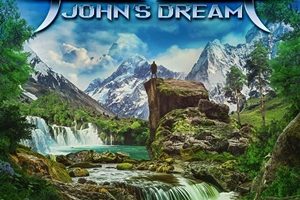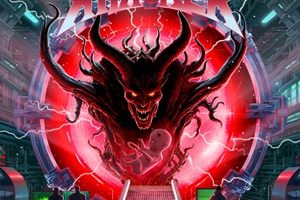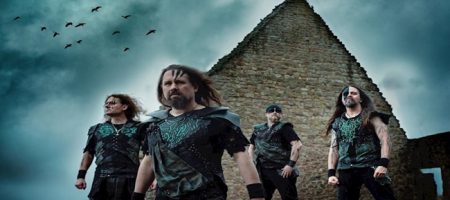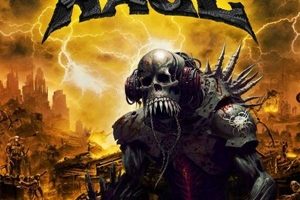Fifth Angel – Older, Wiser, and Ready to Kill
Sunday, 16th July 2023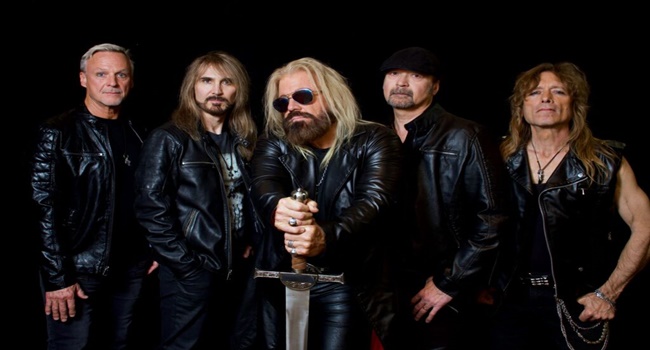
When it comes to melodic power metal, one of the originators of the movement came from the very fertile Seattle scene (pre-grunge mind you) called Fifth Angel. As their profile grew bigger through their first two releases during the 1980’s while being inactive for decades, the band has returned with a vengeance as 2018’s The Third Secret proved that these gentlemen still possess the creative firepower and stellar musicianship / songwriting acumen to remain relevant today. Album number four When Angels Kill is an ambitious concept record, fueled in the melodic power metal genre with a bit more aggressive, progressive movements in mind. The type of record that has many highlights the deeper you delve into its contents – and one that most fans of the bands will treasure.
We reached out to drummer Ken Mary to get us up to speed on the lineup changes between records, how the process came to be to fill out this concept, cover art and its importance in setting the tone for metal albums – how things are this second go around for the band, production /drumming thoughts, plus hopes in appealing to the newer younger generation of metal followers.
Dead Rhetoric: The latest Fifth Angel album When Angels Kill contains a new lineup compared to 2018’s The Third Secret – most surprising being the departure of Kendall Bechtel. What took place behind the scenes, and how were you able to recruit your current vocalist Steve Carlson plus guitarists Steve Conley and Jim Dofka for this record?
Ken Mary: Sure – well those are very good questions! (laughs). I will say the departure of Kendall was a surprise to all of us. Behind the scenes, what happened really was he didn’t want to tour anymore. He didn’t want to play live, he told us he didn’t want to travel, he didn’t like flying, the food, it was uncomfortable for him to adjust to different things. He said I’m leaving the band, around November right after the album came out which was very bad timing. This was in 2018 still. We were stuck with a mess on our hands. We thought we would lay low, give him a month, and he’ll feel different. We waited, and then a month went by, we tried to email him and call him, he wouldn’t take our calls, or emails, so he ghosted us. We had shows coming up, the Rock Hard Festival, Metal Assault, we had shows booked.
We had always planned to have Steve Carlson for these shows, he was in the band since 2018. He would sing the Ted Pilot parts from the first two albums, and then Kendall would sing the new songs from The Third Secret – which we would have played two or three of in these shows. We were thrown into a new situation – and I always joke that we had to replace such a talent as Kendall, not only being a great singer but a great guitarist as well, it took three guys to replace him. On this new album, we have more than what you mentioned, as we have Ed Archer, the original guitar player, Steve Conley, Jim Dofka playing lead guitar solos, Ethan covering a couple of songs with me. It was easier for Jim to finish the solos. The best way I can describe things is, if anyone is familiar with Helloween and the Pumpkins United, it’s like that. Four guitar players, three singers, all this stuff going on. Only two singers as I do some background vocals with Steve. It’s a big family that we used on this record, and I feel like it made things stronger in the end.
Dead Rhetoric: How did it come to be that you ambitiously executed a double concept record this time around? And can you discuss developing the storyline with the music – is it a hand in hand effort, or do you map things out in a larger framework and then hone in song by song into the details?
Mary: We definitely started with a bigger framework. I had a synopsis that we prepared; I think it was two pages long. We sent it between the guys, it was a rather complex synopsis as you can gather from the record. A funny story about this is I sent it to John Macko our bassist, and one of the original members. He got it and said – it’s pretty complex, do you have any other ideas? (laughs). He thought it would be too difficult to get across in a concept record. We had the framework, everybody liked the idea, and we had an idea in our head of what we wanted the album to sound like. We wanted to harken back to our first album, where it’s sort of a harder tone, maybe a little more aggressive. The Third Secret was pretty aggressive too, but the solos were more harmony laden. The guitar solos have more orchestration on their own. We wanted to update it in terms of our playing skills, inject a bit more progressive music into what we are doing.
The concept definitely helped. Two of the first songs that came out are “When Angels Kill” and “The End of Everything”, which is almost at the end of the album. It’s very cool thing to have this framework. It allowed you to look at the story and know when we needed a song like this, a ballad, an aggressive one. The story helped us in terms of developing the songs.
Dead Rhetoric: And was it an obvious choice to go with the title track as the premiere single for the record?
Mary: I think it was. It sort of sets the tone for everything else that happens in the record. It’s a very progressive song, it has a lot of edge to it. It’s probably the darkest Fifth Angel record that we’ve made in terms of the content. If you’ve heard the record, and know the story, it’s a heavy story. I think it does set everything else up. It’s a great prelude to most of the rest of the record, in my opinion.
Dead Rhetoric: When it comes to concept records, what have been some of your favorites over the years? I know you have comparisons to Operation: Mindcrime, Keeper of the Seven Keys, The Wall? Did you have that conscious effort in mind when putting this together?
Mary: We definitely knew where the bar was. We’ve listened to all the great concept records, and certainly for me, I can tell you the first time I heard Operation: Mindcrime. I was on a tour bus in Europe with House of Lords, I had a portable CD player which was kind of a big deal at the time. I was listening to that album in my bunk, and thinking this is unbelievable. I love that record. Obviously, we are trying to hit that bar of The Wall, Operation: Mindcrime, Keeper of the Seven Keys, really all the great concept records. We are aware of that, and do the best… first and foremost, we really wanted to concentrate on the songs. A great concept album has to have great songs. You can have a great concept, but if your songs aren’t good, it’s a waste of time. We wanted to get the songs great first, then work out the little interludes, tie ins and how things will flow together. You can close your eyes, listen to it, and it feels more like a movie than it is a record.
I think we were successful in doing what we wanted to do.
Dead Rhetoric: You recruited Andy Pilkington to do the cover art for When Angels Kill – who has worked on recent covers for Flotsam & Jetsam. What do you enjoy most about his abilities and concepts – and do you still think cover art is important today in heavy metal to set the tone for what listeners can expect as much as it meant in the 70’s, 80’s, and 90’s?
Mary: I think it is important. I have had people tell me that. Andy, he is kind of a genius. I sent some information on the songs, some of the lyrics, and this was the first thing he came back with. The label and the band thought it was perfect for a number of reasons. There’s almost a dual meaning going on with that cover. You have an angel where half the angel is good and half the angel is bad, everybody thinks of angels as guardians, and they are protecting me. On this album it’s about when angels come here to bring destruction. We have one of the characters, Lana who is the love interest of Phoenix, she is also a dual character. You think that she is this wonderful person, and she ends up getting all of his friends killed. The cover had a dual meaning for us, and it was brilliant.
It’s still important, and a piece of the pie. When you look at an album cover, it can make you want to know more about the album, or make you not want to know more. It’s all part of the marketing, the impression of the band.
Dead Rhetoric: What makes this second time back with Fifth Angel that much more special than the first go around during the 80’s / 90’s?
Mary: I think it’s special to us because we are obviously a lot older, and I hope we have more wisdom than what we had when we were younger. The interesting thing is, when we were young, we were writing about all these themes and concepts. We were writing about deception in the media, war, and betrayal, and terrorism. All of these things that unfortunately are still completely relevant today. That’s one of the cool things we can look at now, being much older, that when we were younger, we were talking about very important things and still talking about them. With this concept record we went back and tried to tie in some of those lyrics, song titles, a lot of little easter eggs for people that are long-time Fifth Angel fans where they will listen to the record and hear a snippet of a title from a song of another record, and maybe look more into that song. We are older, a little wiser, and I think the band has some very valid things still to say.
Dead Rhetoric: Beyond your musical accomplishments, many seek out your abilities as a producer these days. How do you approach the art of producing, do you try to think of things on a case-by-case basis depending on the skill levels of the artists on hand?
Mary: As a producer, I will take on projects for various reasons. One time I had a band that was really not good, and I took it on just to see how much I could improve upon the marker and make them sound better. You can do quite a bit with Pro Tools these days, if you are skilled, you can do a tremendous amount. I carry on the same philosophy that I learned on Fifth Angel for the first record. If you do it right the first time, you are never going to regret it. We can go back and listen to that first record, and regardless of our youth and we had a limited budget to work with, we did everything with excellence, and it sounds like we had Pro Tools. Everything is in time, perfectly in time, perfect pitch, everything is tight. It’s astounding to listen to that album so many years later and know we did that album on two-inch tape. We had to play it, had to sing it, or it didn’t show up. It’s a different era, and I’m very proud of that album to this day.
Dead Rhetoric: Do you think younger musicians aren’t as prepared in the studio as you guys had to be back in that era? You were on the clock, and had to get things right, or it didn’t work out?
Mary: Specifically in Seattle in that era, if you look at all the great musicians that came out of Seattle. I don’t know if they were spurred on from a band like Heart in the 1970’s, they were incredible musicians in that era. Something in the water, it rains all the time so maybe there’s nothing else to do but practice. The musicians were a cut above everything else. Go listen to the records from Queensrÿche, Metal Church, Heir Apparent, Fifth Angel. You will hear some incredible musicians. I think it was a different time and a different place, and I think the musicianship was phenomenal.
You can’t make a blanket statement, as there are some musicians now if you go on Instagram or YouTube, there are some incredible musicians. I think there was an attention to detail back then that a lot of musicians today don’t have.
Dead Rhetoric: Where do you stand on the ever-changing music industry and consumption model – as there seems to be a debate between delivering more singles or EP’s on a regular basis for some in a digitally driven way, versus the value of full-length records that may take years to hit the marketplace in physical mediums like vinyl, tapes, and CD formats?
Mary: All I can tell you is as a producer, I see a lot of things trying to happen in specific projects, especially with established bands. If you have an established band, and you are going to try to put out singles, EP’s, it really doesn’t seem to work. At least today, I don’t know what’s going to happen tomorrow, it may change in the next few years. If you are somewhat established, I think if you are doing anything less than an album, it’s something that people are going to be less interested in. I’ve just seen that in the marketplace. We will see as time goes on – as more and more people get prone to listen to a single, maybe that will change.
In our case, the fans definitely wanted a full record. I don’t think they would have paid attention as much to a single or an EP.
Dead Rhetoric: How do you feel the art of drumming in heavy metal has evolved over the decades? What excites you, and where do you think younger musicians need to put more attention and focus on to become more distinctive?
Mary: Drumming is definitely, the bar has been pushed in metal more than in any other musical form. It doesn’t matter if you look at country, rock, pop music, or even fusion. Fusion has stayed… or progressive music. I’ve seen some progressive bands, the playing is considered difficult, but it would be like a vacation if we were playing this stuff. Metal is very difficult, pushes the envelope, and will for years to come. As far as metal drumming, that’s where the cutting edge is, and that’s why I love it. If Buddy Rich was coming up today, he’d be a metal drummer, because it was speed and precision. It’s about speed, precision, and inventiveness.
As far as what they could do to improve their craft. Try to be more creative. Incorporate different things. I was versed in fusion, jazz, Latin, and I had my favorite drummers. Three of my favorite drummers were Neal Peart, John Bonham, and Buddy Rich. I tried to fuse some of the elements of these players into my playing, making something new with it. Paying attention to your creativity is my best advice to young drummers coming up.
Dead Rhetoric: If you had the opportunity to develop a high school or college level course of any subject matter of your choosing – outside the realm of your expertise as a musician and producer- what type of course would you like to teach, and why do you think this subject matter is important to learn?
Mary: (laughs). That’s a great question. I would think a great thing to teach would be… I don’t know what I would title the course, but I do notice on today’s social media there are people who feel the ability to say anything, at any time. Honestly, it’s usually pretty offensive. I’m seeing people say things on my page that are very insulting, and negative. Why do you feel the freedom to say something like that? When I grew up, my mother taught me if you don’t have something nice to say, don’t say it. If I saw a band and I hated their music, I don’t think I’d go on their page and start saying something publicly like ‘I really hate your music, you guys should just pack it in.’. Some of the comments from some of the people, it’s sad. So, I would teach a course on how to be a good human being. It’s definitely don’t be a jerk on social media. People need to be civil to each other.
Appreciate the art. If you don’t like melodic metal, power metal, you like the new stuff – hey, that’s cool. Go listen to the new stuff. You don’t have to come onto our page and spout a bunch of hate to us. That would be my course, civility and being a decent human being.
Dead Rhetoric: What do you think are some of the biggest lessons you learned in your vast musical career, with all the different bands and projects you played in – especially with some premiere artists like House of Lords, Alice Cooper?
Mary: Alice Cooper – what an icon, what a legend. The thing I learned from him is professionalism. We played hundreds of shows, and he only broke character one time. When he went on stage, the lights go down, the crowd roars, when he hit that stage, it was all business. He’s Alice Cooper, bringing it and kicking butt on every single show. That is the thing I’ve learned. It doesn’t matter if you don’t feel good, you are sick, you’re injured, the show must go on. You go out and give everything. I have carried it throughout my career. Always be professional, always try to hit that bar because Alice did every night.
Dead Rhetoric: What’s on the horizon for all activities related to Fifth Angel and Ken Mary in general over the next twelve months or so?
Mary: We are really trying to ramp up more interest in the band. Now that the band has been around for a long time, but a lot of older fans are getting too old to listen to our music anymore. We have to try and develop a new, younger fan base as well. Engage a fan base that loves power metal, and I think we can do that. If you look at some of the bands that fit in with Comic Con, I think Fifth Angel could fit that demographic.












